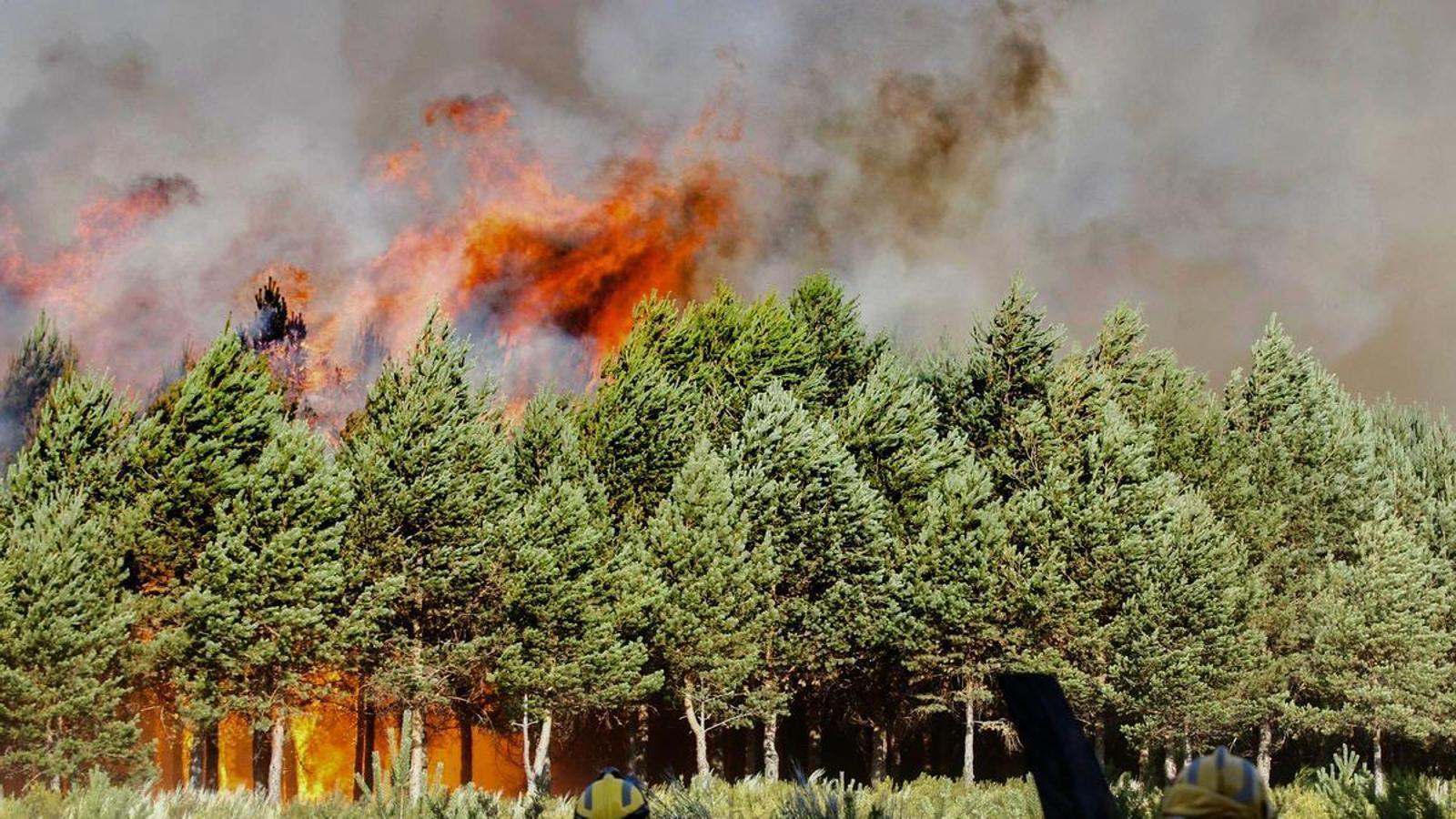The fire that burns half of Spain gives no respite.
Ayuso says politicians must be "in the right place" and Feijóo calls on the Spanish government to mobilize the army.

Without respite. The fire that has been ravaging much of Spain for days remains out of control after a Friday in which high temperatures and weather conditions worsened the situation. While the day began with nine Level 2 fires—indicating high risk—at press time, there were 16, already affecting the provinces of Ourense, Zamora, Salamanca—with five major active fires declared this afternoon—and Ávila. The day also closed with four members of the Military Emergency Unit (UME) injured.
As expected, the heat wave sweeping across the Iberian Peninsula has complicated the situation. Firefighters feel powerless to control the flames and are focusing their efforts on trying to save threatened homes. It's an exhausting race, as new fronts keep appearing, leaving no time to control existing fires. In Galicia, where 32,000 hectares have already been burned – 16,000 of them in the Chandrexa de Queixa fire, the largest in the region's history – the scene is one of devastation, with villages razed, houses on fire, dead animals... To the point that the Xunta has admitted that it is "community" using any means available.
The situation is critical. Despite the fact that some of the lockdowns of recent days have been lifted, new ones have had to be decreed at the same time. Communications are also complicated. The A-52 motorway remained closed in several sections between Ourense and Zamora, and traffic was also restricted on a dozen secondary roads in the affected provinces. The advice from the authorities is to limit mobility as much as possible in these areas. The railway line between Galicia and Madrid also did not operate all day, and the Minister of Transport, Óscar Puente, indicated that service will not be able to resume this Saturday either.
The weather outlook is not optimistic, with a heat wave that is expected to last throughout the weekend. Given this scenario, Spanish President Pedro Sánchez will chair the meeting of the State Committee for Coordination and Management of the Special Emergency Plan (CECOD) this Saturday. A meeting at which he will discuss activating the emergency level so that the Spanish government, and not the regional governments, assumes control of the situation.
For now, this Friday Sánchez spoke with the presidents of Galicia and Castilla y León, as well as with those of Extremadura and Asturias, where there are also fires. All of them have asked for more resources to fight the fires. This morning, from Castilla y León, the leader of the People's Party (PP), Alberto Núñez Feijóo, had called on the Spanish government to mobilize the army, predicting that the "extraordinary and critical" situation will worsen even further.
The PP attacks Sánchez.
Accompanied by the regional president, Alfonso Fernández Mañueco, Feijóo reiterated his criticism of Pedro Sánchez's administration, saying it has reduced the air resources needed to combat the fires and is not efficiently coordinating its resources with those of the autonomous communities.
The president of Madrid, Isabel Díaz Ayuso, also reappeared this Friday after being criticized for continuing her vacation in Miami despite the fire that burned in Tres Cantos. The Popular Party leader called on Sánchez to deploy the army and, in Europe, to provide more resources to fight the fire. She also agreed with Vox in arguing that "the ideological agenda" is responsible for the inability to fight the fires more effectively, alluding to policies that combat climate change, a battle between ultra-right and conservative forces throughout the Western world.
Four members of the UME (Union of the Left) were injured.
For now, a total of 1,300 members of the Military Emergency Unit are participating in the efforts to extinguish the various fires. In addition to these personnel, 2,100 are assigned to logistical support tasks. The soldiers are deployed to the fires affecting Ourense, Castile and León, Asturias, Extremadura, and Teresa de Cofrentes, in the Valencian Community. In fact, this Friday, four members of the Military Emergency Unit (UME) were injured in Yeres (Castile and León) while working to extinguish the fire. Three suffered burns of varying severity, and one dislocated his shoulder. All were taken to the Ponferrada hospital.
